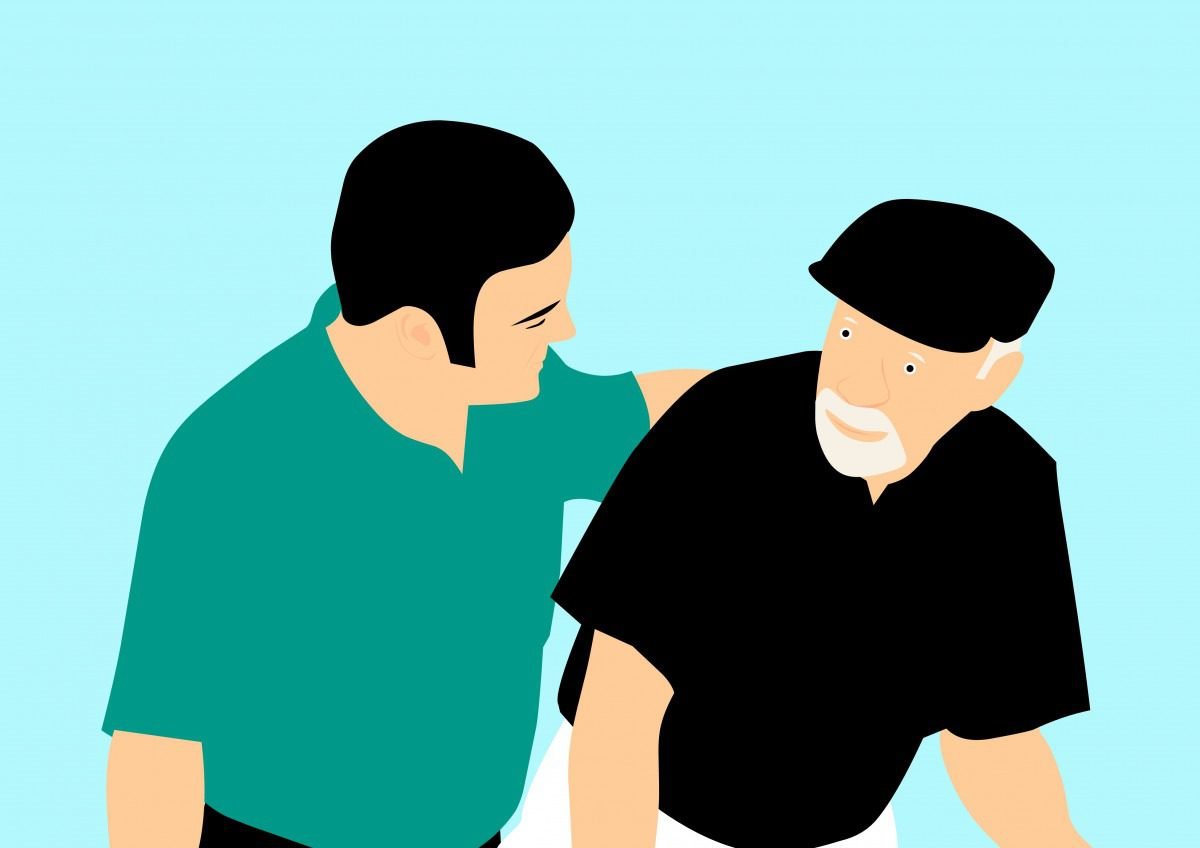How To Talk To Someone With Dementia? The Do’s & Don’ts
Talking to a loved one with dementia is a rewarding feeling but it can also be quite difficult at times. It can be frustrating to understand their emotions and feeling but it is also crucial to assess what your loved one is thinking or going through.
Evaluating their thought process by communicating can help build a stronger bond between you and them. It is essential to remain patient and take time to recognize their needs to help them in an effective manner. This article will help you explore some of productive aspects of communication with dementia patients.
If you’re looking for a dementia caregiver in Florida, check us out by clicking here!
How to Initiate a Conversation with Dementia Patients?
Dementia in a loved one can be a challenging situation to go through. Since the disorder is mainly about memory impairments, patients might not be able to recognize people, even the ones close to them.
Greetings
Approach the patient in a calm manner, greet them in a warm and friendly way. Focus on buiding a safe environment for them to talk. Respect their personal space and try to avoid physical greetings if the patient doesn’t seem to recognize you.
Introduce Yourself
Dementia patients might struggle remembering people, therefore it would be helpful for them if you introduce yourself every time you meet them even if you two share a close bond.
Enlighten them with who you are, what relation you have with them and the reason of your visit. Provide them with the information they need and leave no room for ambiguity.
Physical Interaction
Aim at building a safe surrounding for the patient. Interact physically only if the patient is comfortable with you or initiates the physical contact first. Focus on improving the room conditions such as lighting and room temperature. Make sure the patient feels secure talking to you.
Holding a Conversation with Dementia Patients
As the disorder progresses, it becomes hards to keep up a conversation with dementia patients but recognizing their wants and needs through an effective communication could save you the hassle.


Keep it Simple
Keep the conversation as simple as you can. Dementia patient may find it hard to process complex information and complicated words, therefore, the best way to keep up a conversation with them is to simplify words and discussions.
Use a Gentle Tone
Avoiding talking in a loud voice as it might startle the patients, instead, talk in a gentle tone. Make sure they feel like it is a safe space for them to have an exchange of dialogues.
Stay Patient
Another vital element is to stay patient, don’t rush and keep up with their pace. Give them time to express how they feel and try not to interrupt or complete their sentences.
Use the Person’s Name
Learn their preferred name and use it while chatting with them. Using their name reminds them that you’re still talking and keeps them interested in the conversation.
Make Eye-Contact
Maintaining eye-contact helps forge a connection between you and the person you’re taking to. It ensures the patient that they are being heard and that their opinion is being valued.
Keep a Smile on your Face
Smiling ensures a pleasant and healthy environment between two while having a conversation. It can put the patient at ease and ensure them that they are getting reassurance from you. Patients may also feel comfortable exchanging dialogues with you.
Ensure Vision and Hearing are Perfect
Other key elements to consider are vision and hearing. Position yourself at their eye-level and make sure they can see you well while having a discussion. Ensure they can hear you properly, talk with clarity and use a calm tone.
Enter their World of Interest
People tend to enjoy conversations more when it is of their interest. Try initiating a dialogue regarding a subject that intrigues the curiosity of the patient. Make sure to let them express what amuses them without interrupting.
Eliminate Distractions
Patients may lose track of conversation in the presence of external distractions such as background TV noise or flickering lights. Try to diminish distractions as it might disrupt the chatting.
Avoid Interrogation
Asking questions from dementia patient can be quite distressing for them as it might be hard for them to recall events youre referring to. Instead of interrogating give the patient something easy to focus on or to retrieve from their memories like instead of asking “What did you have in breakfast today?” try asking “I heard you had pancakes in breakfast today”
Related Read: Living With Someone With Dementia | Challenges & Dangers
Do Dementia Patients Engage in Meaningful Conversations?
Yes, dementia patients in early stages can engage in meaningful dialogues by sharing stories and thoughts effectively. However, as the disorder progresses, the patients ability to reason or present logical ideas are altered.
Meaningful interactions often involve sharing emotions, reminiscing and connecting on a personal level. Since the disorder involves cognitive impairment, the patients of late stage of dementia might not be able to participate in such conversations.
Nonetheless, even in these stages, non-verbal communication, gestures, touch, and expressions of affection can still facilitate meaningful connections. These conversations offer a way to validate their experiences, emotions, and memories, even when their cognitive abilities are compromised.
Is it ok to Tell Patients with Dementia They are Wrong?
Telling them they are wrong is one of the few things you should never say to a patient with dementia. The best way is to avoid contradicting or correcting them even if they are wrong.
Arguing with your loved ones can upset them and make them angry. Instead, try changing the topic of discussion to something pleasant and free of diversity of opinions.
How does Dementia Affect Communication?
As the disorder progresses, the patients lose their hold on communication. This might be a distressing situation for the patient as well as their family, friends and carers.
WIth memory loss, a patient with dementia also finds it difficult to express himself or herself. On early stages of the disorder, patients may feel less difficulty in expressing emotions, conveying messages or expressing logical ideas.
However on the late stages, patients may repeat themselves, get confused often or find it hard to keep up with longer discussions. Their inability to express, hold a conversation also makes their behavior difficult or challenging to understand.
How to Communicate Non-Verbally with Dementia Patients?
With the progression of the disorder, patients may mainly use non-verbal communication to express their emotions.Therefore, it is vital to explore some non-verbal ways of communication to stay in touch with you loved ones.
- Use physical contact to provide reassurance and support.
- Using visual prompts can help dementia patients convey their feelings more effectively.
- Sit with them at a respectful distance to avoid intimidating them.
- Try to keep the patients engaged when their body language seems uninterested or bored.
- Conduct activities that brings them amusement.


How to Calm Down a Dementia Patient?
Patients with dementia, at times are not easy to deal with. They may get anxious, stressed or aggressive under certain situations. However, its significant to not lose temper, avoid scolding or yelling at them and remain patient under all cicumstances.
Be a Good Listener
Listen to what triggers and startles them. Value their concerns and offer a solution. Let them know you understand how they feel and how difficult it must be for them.
See Things From their Pespective
One way to offer an effective solution to their problem could be to understand where they are coming from and see the world from their eyes. Try understanding how they feel and present a helpful alternative to their problem.
Explore Constructive Activities
Help your loved ones explore activities they enjoy, keep them distracted. Having a hobby can actively help them avoid boredom and loneliness, also enablng them to do something productive.
Conclusion
Dementia affects everyone differently so its essential to communicate in a way that is suitable for the person. Caring for someone with dementia can be a hectic responsibility that might get frustrating at times. But with patience, understanding and adaptability the journey can be quite rewarding. The importance of a safe and healthy environment, validating feelings and various communication strategies can lead to a nurturing bond between you and your loved ones.
FAQs
What should I do when someone with dementia repeats the same questions or statements?
Repetition is a common phenomenon in dementia patients. It is significant to remain patient and answer their questions in a simple manner.
What do I do if dementia patient becomes upset during a convesation?
Remain calm, provide reassurance to the patient and try redirecting the conversation to a pleasant topic.
How can I ensure safety while having a conversation with a dementia patient?
Prefer a peaceful environment with no distractions. Maintain a confident body language so the patient doesn't feel threatened.
What should I do if patient with dementia starts using non-verbal communication?
Adapt to what they feel comfortable with. Use gestures, touch and facial expressions to convey your emotions.
Should I use humor when talking to someone with dementia?
Humor is a great way to break the ice but stay considerate of their feelings. Try not to hurt their sentiments.


![Why Do Dementia Patients Stare At You? [Behaviour Explained]](https://caringhandshomecarefl.com/blog/wp-content/uploads/2023/11/Why-Do-Dementia-Patients-Stare-At-You-768x511.jpg)




